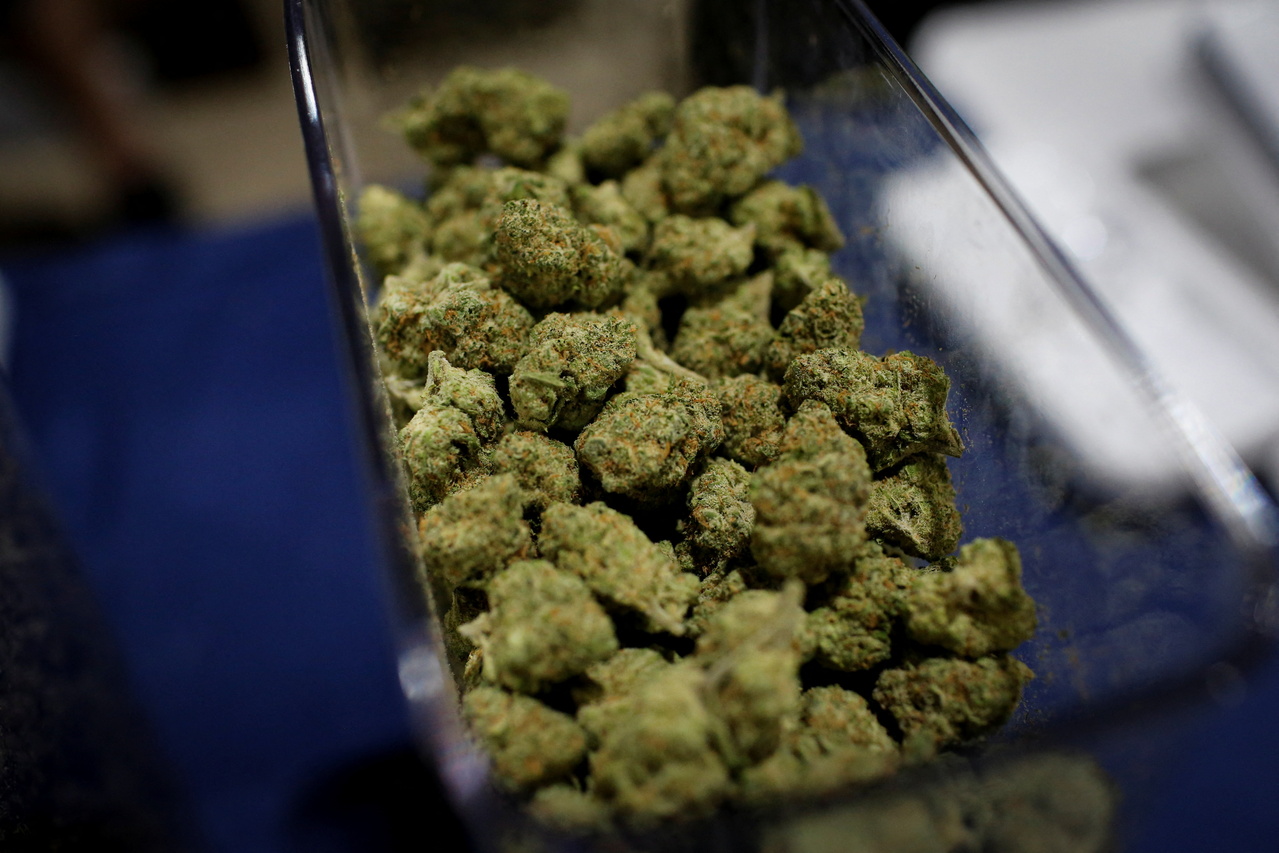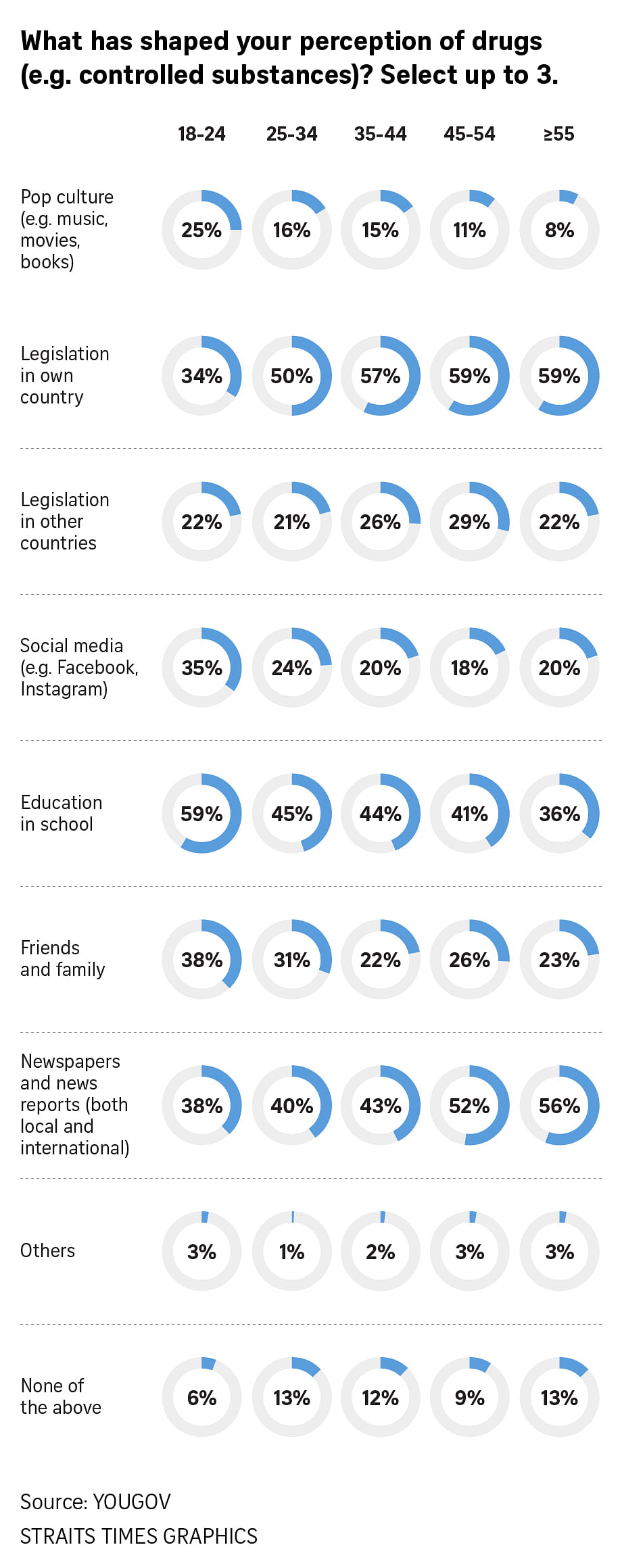S'pore youth more likely to perceive cannabis as not harmful
Sign up now: Get ST's newsletters delivered to your inbox

A survey of 1,055 Singapore residents showed 26 per cent aged between 18 and 24 perceived cannabis to be not harmful or not very harmful.
PHOTO: REUTERS
SINGAPORE - Younger Singaporeans are more likely to perceive cannabis or weed as not harmful and to have considered using controlled substances or prescription drugs without a prescription than their elders.
According to a survey of 1,055 Singapore residents by public opinion company YouGov done in collaboration with The Straits Times, people aged between 18 and 24 are also more likely to have their views on drugs shaped by social media and pop culture than their elders.
The survey, which was done using a demographically representative sample of Singapore's population, showed that 26 per cent of Singaporeans aged between 18 and 24 perceived cannabis to be not harmful or not very harmful.
One-fourth of those in the next age range - 25 to 34 - had the same opinions, among whom 19 per cent said they thought cannabis was not harmful.
This stands in contrast to the opinions of older Singaporeans.
Of those aged 45 to 54, 10 per cent said cannabis was not harmful or not very harmful, while among those over 55, 7 per cent expressed the same opinion.
Those between 35 and 44 formed the middle ground, with 20 per cent saying they perceived cannabis to be not harmful or not very harmful.
However, when asked about drugs such as heroin or methamphetamine, Singaporeans across all ages had more similar perceptions of the harm in these substances.
Mr Andy Leach, director of addiction services and principal addictions counsellor at psychiatry and psychology clinic Promises Healthcare, said this may be due to the growing idea that cannabis is a "soft" drug in comparison to drugs such as cocaine and methamphetamine, which are more commonly considered "hard" drugs.
He said: "Young people I see come to me and say things like oh, it (cannabis) is a plant, it can't be that dangerous.
"But they don't understand that the way it's been grown and cultivated, it's way more potent than it was 10 or 20 years ago."
The survey also found that younger people were more likely to have considered trying a controlled substance or a prescription drug without a prescription.
About 21 per cent of those aged between 18 and 24, as well as those aged 25 to 34, said they had considered trying a controlled substance, compared to roughly 10 per cent of those above 55.
These perceptions have a part to play in people starting drug use, said Dr Thomas Lee, consultant psychiatrist at psychiatry clinic Resilienz.
He said the idea that these drugs are not harmful as well as the influence of friends are crucial factors.
He added: "Many times, what I've seen in my patients is that drug use starts when groups of friends decide to start to experiment together."
However, criminologist at Nanyang Technological University Olivia Choy said that while the perception that marijuana is not harmful may "tip the scale" for someone and start the person on drugs, perception alone is unlikely to be enough to influence a person's behaviour.
She said: "We should be cautious not to overstate the influence of these perceptions from the media on criminal behaviour such as drug use.
"There are certainly many other factors that influence whether an individual uses drugs, including whether one has peers who also use drugs and biological predispositions towards such behaviour."
Dr Choy added that research has found that adolescents who had seen a message on social media about the benefits of using marijuana were only 6 per cent more likely to use marijuana.
Mr Leach also emphasised the possibility of a predisposition towards addiction, and said it is safer for an individual not to take a chance.
He said: "About 10 per cent of any human population is more predisposed to addiction.
"So using drugs like marijuana is like playing Russian roulette with a smoking gun, you don't know what is going to happen to your brain chemistry or your mental health."
He added that addiction itself is a disease, and it is important for parents and teachers to have open and honest conversations with young people about drug use rather than making them afraid to talk about it, which may lead to them keeping it a secret.
He said: "Without education, a teen or a young person is alone out there in situations where others may be trying or offering them drugs."
Dr Lee also emphasised the importance of education.
He said: "It (education) shouldn't just be when police officers come to schools to talk about it, parents can bring it up whenever - like when they are watching TV and they see someone using drugs or other situations like that."

Getting help
- National Care Hotline: 1800-202-6868 (8am to 8pm)
Mental well-being
- Fei Yue's Online Counselling Service: eC2.sg website (Monday to Friday, 10am to noon, 2pm to 5pm)
- Institute of Mental Health's Mental Health Helpline: 6389-2222 (24 hours)
- Samaritans of Singapore: 1800-221-4444 (24 hours) /1-767 (24 hours)
- Singapore Association for Mental Health: 1800-283-7019 (Monday to Friday, 9am to 6pm)
- Silver Ribbon Singapore: 6386-1928/6509-0271 (Monday to Friday, 9am to 6pm)
- Tinkle Friend: 1800-274-4788 (Monday to Friday, 2.30pm to 5pm)/ Tinkle Friend website (Monday to Thursday, 2.30pm to 7pm and Fri, 2.30pm to 5pm)
Counselling
- TOUCHline (Counselling): 1800-377-2252 (Monday to Friday, 9am to 6pm)
- Care Corner Counselling Centre (Mandarin): 1800-353-5800 (10am to 10pm)
- Drug abuse Narcotics Anonymous Singapore: 8405-8432 (24 hours)


